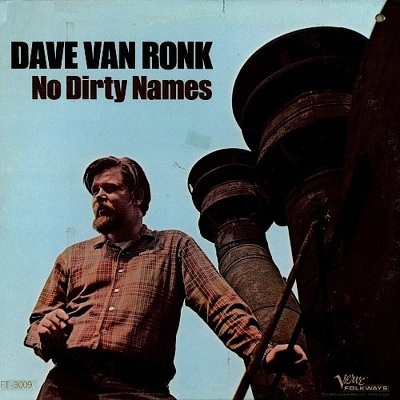
No Dirty Names
by Richie Unterberger While this is certainly among the more obscure of Dave Van Ronk's early LPs (none of which were exactly big sellers), it's one of the better ones. It's not radically different from most of the folk-blues albums he made in his early career. But there's a little more variety to the arrangements and repertoire than usual, with just as much of Van Ronk's growling gruff voice as always. For one thing, it's not solely Van Ronk and his acoustic guitar; there's also some acoustic guitar by Dave Woods and, more surprisingly, bass by Chuck Israels, a member of the Bill Evans Trio for much of the '60s. Van Ronk's tendency toward hokey good-time vaudeville-ragtime is kept in check, resulting in a moodier and more varied outing than many others in his catalog. While many of the 13 tracks are the kinds of folk and blues standards you might expect in a Van Ronk set (like "One Meatball" and "Statesboro Blues"), there's also a pretty good five-minute cover of Brecht-Weill's "Alabama Song." Stranger is "Zen Koans Gonna Rise Again," featuring a ghostly organ by Barry Kornfeld (though none of the other songs feature organ). Van Ronk's jazz influence comes to the fore in covers of Mose Allison's "One of These Days" and a rambunctious interpretation of Dizzy Gillespie's "Blues Chante" that's about as close as Van Ronk comes to R&B on the LP. For collectors, though, the major alarm bells are rung by the plaintive if unexceptional "The Old Man." For it's an early Bob Dylan song that was never covered by anyone else, and made its first appearance on this album, though Van Ronk re-recorded it for subsequent releases many years later (Dylan's own version, an outtake from his first album, finally surfaced on The Bootleg Series, Vols. 1-3, where it was titled "Man on the Street"). And you've got to be aware of Dylan's authorial involvement beforehand to recognize the song as one of his works, since no writing credits are given for the tracks on the back cover (though they're on the inner label).
